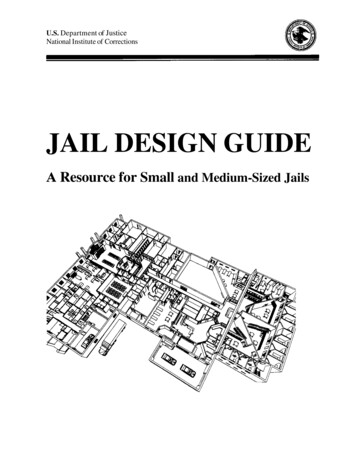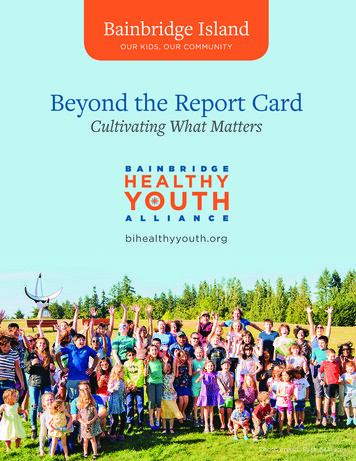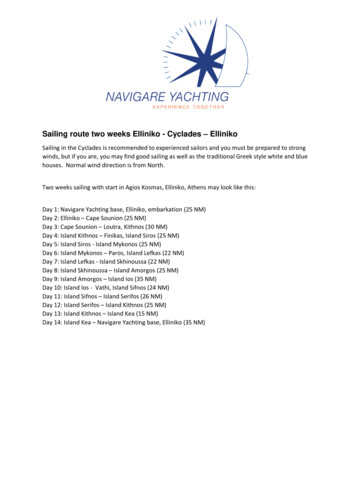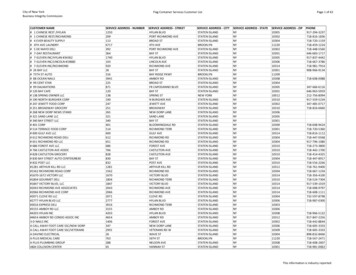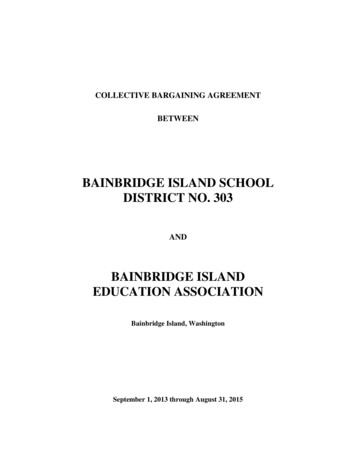
Transcription
H U M A NR I G H T SW A T C H“An Island Jail in theMiddle of the Sea”Bangladesh’s Relocation of Rohingya Refugees to Bhasan Char
“An Island Jail in the Middle of The Sea”Bangladesh’s Relocation of Rohingya Refugees to Bhasan Char
Copyright 2021 Human Rights WatchAll rights reserved.Printed in the United States of AmericaISBN: 978-1-62313-911-7Cover design by Rafael JimenezHuman Rights Watch defends the rights of people worldwide. We scrupulously investigateabuses, expose the facts widely, and pressure those with power to respect rights andsecure justice. Human Rights Watch is an independent, international organization thatworks as part of a vibrant movement to uphold human dignity and advance the cause ofhuman rights for all.Human Rights Watch is an international organization with staff in more than 40 countries,and offices in Amsterdam, Beirut, Berlin, Brussels, Chicago, Geneva, Goma, Johannesburg,London, Los Angeles, Moscow, Nairobi, New York, Paris, San Francisco, Sydney, Tokyo,Toronto, Tunis, Washington DC, and Zurich.For more information, please visit our website: http://www.hrw.org.
JUNE 2021ISBN: 978-1-62313-911-7“An Island Jail in the Middle of the Sea”Bangladesh’s Relocation of Rohingya Refugees to Bhasan CharMap of Bangladesh/CXB/Bhasan Char . iSummary . 1The Rohingya: A History of Suffering.4Quarantined on Bhasan Char, Separated from Families . 5Relocation from Cox’s Bazar . 6Role of the United Nations and Donors . 9Methodology . 11I. Bangladesh’s Response to the Rohingya Refugee Crisis . 13Crimes against Humanity in Myanmar . 14Lack of Support from Regional Governments . 16Dire Conditions and Abuses in the Cox’s Bazar Camps . 18II. Bangladesh’s Bhasan Char “Solution” . 23Inadequate Disaster Response Strategy . 25First Arrivals on Bhasan Char: Boat Rescues Held Captive . 28Desperate Plea to Return During “Go and See” Visit . 30III. Unprepared, Haphazard Relocations to Bhasan Char . 32Lack of Free and Informed Consent . 32Failed Promises of Education . 36Lack of Adequate Health Care . 38No Capacity for Emergency Medical Care . 43Lack of Sexual and Reproductive Health Care . 44Food Shortages . 45False Promises of Livelihood . 47Abuses by Security Forces. 48
IV. Recommendations . 51To the Government of Bangladesh . 51To Protect Refugee Lives and Rights on Bhasan Char. 51To Protect Refugee Lives and Rights in Cox’s Bazar . 52To the Myanmar State Administration Council Junta . 53To Myanmar’s Civilian Leadership, including the National Unity Government . 54To the United Nations . 55To Donor Countries . 56To ASEAN Members and Other Countries in the Region . 57Acknowledgments . 58Appendix I: Letter from Bangladesh Ambassador to the United States MohammadZiauddin . 59Appendix II: Human Rights Watch Letter to Foreign Minister A.K. Abdul Momen . 61Appendix III: Human Rights Watch Letter to the United Nations High Commissioner forRefugees (UNHCR) .66Appendix IV: Human Rights Watch Letter to HR Wallingford . 70Appendix V: Human Rights Watch Letter to Sinohydro . 73
Map of Bangladesh/CXB/Bhasan Chari
SummarySince December 2020, the Bangladesh government has moved nearly 20,000 Rohingyarefugees to Bhasan Char, a remote silt island in the Bay of Bengal. With the approachingmonsoon season, refugees and humanitarian workers alike fear that inadequate storm andflood protection could put those on the island at serious risk. This, alongside foodshortages, unreliable water sources, lack of schools and health care, and severerestrictions on freedom of movement, makes many refugees fear they are stuck on “anisland jail in the middle of the sea,” as one child described it.The Bangladesh government has touted Bhasan Char as a solution to the severeovercrowding in the refugee camps in Cox’s Bazar where nearly one million Rohingyarefugees from Myanmar live. The government aims ultimately to relocate 100,000 refugeesto the island.But there are serious concerns that Bhasan Char is not safe for settlement. Formed only inthe last 20 years by silt deposit in the delta, its shape and shorelines have repeatedlyshifted. Three to five hours from the mainland by boat, inaccessible in high winds, andlacking an airstrip for fixed-winged planes, Bhasan Char has limited capacity forevacuation in the event of a cyclone. During severe weather, the island is cut off from therest of the world.Since infrastructure development started on Bhasan Char in 2017, humanitarian expertshave been raising the alarm about safety, pointing out that it would be difficult, if notimpossible, to support refugees’ humanitarian and protection needs on the island. TheBangladesh government had promised the United Nations and donors that no refugeeswould be relocated to the island until independent humanitarian and technical expertshad the chance to assess its emergency preparedness, habitability, and safety. But thegovernment reneged on those pledges, moving ahead with relocations while refusing toallow an independent assessment.In doing so, it has presented the United Nations and international donors with a faitaccompli, putting pressure on them to start supporting the refugees on Bhasan Char ortake responsibility for the consequences. Meanwhile, Bangladesh officials insist the1HUMAN RIGHTS WATCH JUNE 2021
island has been secured with embankments, and that the homes and cyclone shelters arebetter than anything available to millions of Bangladeshis.After a four-day visit to the island by an 18-member team of UN officials in March 2021organized by the government, the UN in Bangladesh said that it recognized “thehumanitarian and protection needs” of the refugees in Bhasan Char and was prepared todiscuss “future operational engagement.” Refugees told Human Rights Watch theauthorities had warned them against complaining and only a selected few were allowed tomeet the team. During a follow up UN visit in May 2021, thousands of refugees gathered,insisting that they wanted to meet the officials, and said they were “badly beaten” bysecurity forces.The United Nations and donors should recognize that the hurried relocation to the islandpresents serious concerns to the rights of the refugees, including their lives andlivelihoods. This is particularly urgent because during the monsoon season there is graverisk that the refugees, as well as several thousand Bangladeshi officials and volunteers,could end up confined on the island in cyclone-prone waters without adequate food,water, or medical care when transportation is severely limited due to weather conditions.Experts are concerned that current embankments around the island are inadequate towithstand a category three storm or worse. Storm surges in the Bay of Bengal are some ofthe highest in the world, frequently exceeding 5 meters—at least 27 times in the last 60years—and sometimes even topping 10 meters. Climate change modelling predicts thatcyclones in the Bay of Bengal are likely to increase in frequency and intensity.The government says the relocation to the island is needed because the mainland refugeecamps are getting more and more crowded, and that only those refugees who volunteer arebeing moved. “In heavily congested Cox's Bazar refugee camps they face manyhardships,” Foreign Minister A.K. Abdul Momen said. “They will certainly find life morecomfortable in Bhasan Char.” He even described the island as a “beautiful resort.” In aDecember 8, 2020 letter to Human Rights Watch, Bangladesh authorities noted that therelocation process had been carried out in a fully transparent and voluntary manner after“a number of Rohingya representatives undertook a ‘go and see’ visit to Bhasan Char tosurvey the facilities and make an independent and informed choice”:“AN ISLAND JAIL IN THE MIDDLE OF THE SEA”2
The Government of Bangladesh has worked hard to ensure that all modernamenities are provided to Rohingya on Bhasan Char, including health care.The 13,000-acre island has year-round fresh water, an uninterrupted supplyof electricity, agricultural plots, cyclone shelters, two hospitals, fourcommunity clinics, mosques, warehouses, telecommunication services, apolice station, recreation and learning centers, playgrounds and more.This report, based on 167 interviews with refugees along with humanitarian experts, findsthat the government has misled the Rohingya refugee community and donors aboutconditions on Bhasan Char. Some refugees described being forced to relocate withoutinformed consent. Others agreed that the shelters are superior to those in the camps andthat there is plenty of open space, but also reported food shortages, inadequate healthservices, no access to education, onerous restrictions on movement, and a lack oflivelihood opportunities.Azara, 65, told Human Rights Watch:They lured us with the promise of good food and good healthcare facilities.We are old people. We came here so we could work and earn a living andwould no longer need others to support us. But after coming here I find thatwe are not given proper health care, good medication, or proper utilities.Even the rice we are provided is not enough. The health center is far awayfrom our shelter where we need to go on foot. I have gone to the healthcenter more than four times, but they don’t prescribe proper medication.Instead of addressing these problems, Bangladesh authorities are increasingly crackingdown on refugees who speak out or try to leave the island. Some refugees alleged thattheir relatives were arbitrarily detained and beaten for attempting to leave, counteringBangladesh government claims that all relocations are voluntary. Refugees also said theywere beaten for moving outside their compound. In April 2021, witnesses say aBangladeshi sailor beat a group of children with a hard-plastic PVC pipe for crossing intoanother block to play with other children.3HUMAN RIGHTS WATCH JUNE 2021
The UN and concerned governments should take a strong stand so that Bangladeshensures that individuals are not at risk on the island, that the rights of refugees arerespected, and that security force personnel who commit abuses are held to account. TheUN has told Human Rights Watch and confirmed in the recently launched Joint ResponsePlan that it has sought discussions with the Bangladesh government on any futurehumanitarian operational engagement on Bhasan Char.The Bangladesh government often stalls and delays such engagement with the UN andshould instead immediately hold these consultations both at the policy and technicallevel. It should follow through on its promises for an independent assessment of thehabitability and emergency preparedness of the island and make any necessaryadjustments, including returning refugees to Cox’s Bazar if it is deemed unsafe orunsustainable. In the meantime, any refugees who wish to return to Cox’s Bazar should beallowed to do so immediately.The Rohingya: A History of SufferingWhile the burden of dealing with this mass influx of Rohingya refugees has mostly fallenon Bangladesh, responsibility for the crisis lies with Myanmar. The Myanmar military’slarge-scale campaign of killings, rape, arson, and other abuses amounting to crimesagainst humanity and acts of genocide caused the ongoing humanitarian crisis. AndMyanmar’s failure to take any meaningful actions to address either recent atrocitiesagainst the Rohingya or put an end to the decades-long discrimination and repressionagainst the population, including the crimes against humanity of apartheid andpersecution, is at the root of delays in refugee repatriation.Since 2017, the Bangladesh government has demonstrated a commitment to the principleof nonrefoulement—not returning refugees to a place where they would face persecution.Refugees who have spoken to Human Rights Watch overwhelmingly express a desire toreturn to their homes in Myanmar once it is safe, they have citizenship and freedom ofmovement, and there is genuine accountability for atrocities. “Bangladesh is not mycountry,” said Kadir Ahmed, 24. “I want to go back to our land. If the Myanmar governmenthad not killed and tortured us, we would not have left.”“AN ISLAND JAIL IN THE MIDDLE OF THE SEA”4
Since the military coup in Myanmar on February 1, 2021, the country is fully controlled bythe same generals who led the campaign of mass atrocities against the Rohingya in 2017,making the prospect of a safe and dignified return ever more distant.Quarantined on Bhasan Char, Separated from FamiliesThe first refugees to be housed on Bhasan Char were brought there after they were rescuedat sea. In May 2020, the Bangladesh navy responded to international calls to rescue twoboats carrying 306 Rohingya refugees that had been lost at sea. Bangladesh, Myanmar,Thai, and Malaysian authorities had earlier refused to allow the refugees to land.That Bangladesh rescued the refugees while its neighbors ignored them is bothcommendable and characteristic of Bangladesh’s efforts to provide safe haven toRohingya refugees. A month earlier, the Bangladesh coast guard had rescued another 390Rohingya refugees on a boat that had reportedly been turned away by Malaysia. Therefugees were starving, dehydrated, and ill after drifting at sea for months before endingup back at the Bangladesh coast. Several had died, their bodies dumped into the sea.Yet, after bringing the 306 ashore, instead of reuniting the refugees with their families inCox’s Bazar as they had done earlier, the authorities brought them to Bhasan Char.Officials initially said that the refugees were only being held temporarily to quarantinefrom any potential spread in the camps of the virus that causes Covid-19. But a full yearlater, the refugees are still being held on the island against their will. Yusuf Ali, 43, wholives in Cox’s Bazar and whose two daughters are being held on Bhasan Char, said, “theCiC [Camp-in-Charge official] told us that our daughters would never be returned to ushere. They said, ‘You still have time to choose to go there [to Bhasan Char], otherwiseforget about your children.’”After pleading for months to be returned to their families in Cox’s Bazar, a group ofrefugees went on hunger strike in September 2020. In video accounts received by HumanRights Watch, one Rohingya woman on hunger strike said: “We don’t want food, what wewant is to go back to our families. It’s better to die than to live here.” In response,Bangladesh authorities beat some of the refugees with tree branches and rubber sticks.5HUMAN RIGHTS WATCH JUNE 2021
On April 28, 2021, the Bangladesh authorities sent another 30 Rohingya refugees toBhasan Char after rescuing them at sea instead of reuniting them with their families inCox’s Bazar.Relocation from Cox’s BazarAfter bringing the first group of refugees who had been rescued at sea to Bhasan Char, theBangladesh government began mass relocations of refugees from the camps in Cox’sBazar to the island. Since December 2020, thousands of other refugees have beentransferred to Bhasan Char from the camps in Cox’s Bazar. The Bangladesh governmentinformed Human Rights Watch that it had “ensured adequate supply of food along withproper sanitation and medical facilities for Rohingyas on Bhasan Char.” The governmentalso told Human Rights Watch:[T]he relocation was preceded by adequate preparations and consultationswith stakeholders. Several rounds of discussions, based on the queries ofthe United Nations, were also arranged and we hope that the internationalcommunity and the United Nations, as per its mandate, will be involved inthe process soon.In a statement on December 2, the United Nations, however, had said that it had not beeninvolved and that “any relocations to Bhasan Char should be preceded by comprehensivetechnical protection assessments,” reiterating that the UN stood ready to proceed withsuch assessments “if permitted by the Government.” The UN also said that the governmentshould respect commitments to ensure any relocation is voluntary.Though the government has said that all relocations have been based on informedconsent, some of the refugees told Human Rights Watch that they had not willinglyvolunteered.Some refugees even fled the Cox’s Bazar camps out of fear of forced relocation. Kobir, 53,who went into hiding, told us:“AN ISLAND JAIL IN THE MIDDLE OF THE SEA”6
My name appeared on the list so now the CiC has threatened me, sayingthat since my name is there, I must go. He said, even if I die, they will takemy body there [to Bhasan Char]. I don’t want to go to that island.Others said they were provided with misleading information and incentives to move. Anjul,40, said:They trapped us with plenty of promises. They said we would have goodfood and plenty of livelihood opportunities, like tending livestock, fishing,or going to the mainland. Most importantly, when we boarded the bus theygave us 5,000 taka [US 60] each, promising that we would be given 5,000taka each month. But after arriving there are no such opportunities and nowwe are facing a food shortage crisis.Several refugees on Bhasan Char said their freedom of movement was being denied andthat security forces deployed on the island were often abusive. Others complained thatthey did not have enough food and that people with illnesses, including children, weredying due to a lack of adequate health care. Many refugees complained that they were onlygiven paracetamol (acetaminophen) for health issues including ulcers, chest pain,diabetes, and asthma. Those in need of emergency medical care had to pay for and obtainpermission from authorities to be transported to the nearest mainland hospital, which wasat least five hours away by sea and road. Such transportation is nearly impossible byeither boat or helicopter in inclement weather.Human Rights Watch interviewed 14 people who sought medical care on the island, all ofwhom said that the facilities and care they received were inadequate. In four cases, whenHuman Rights Watch later checked, family members said that their relatives had died,which they believed was because of grossly inadequate access to emergency health care,including a woman who died in childbirth. Anjul, 40, said: “In the camp [in Cox’s Bazar], ifany of us became sick at least we would be able to go to a doctor or hospital or the NGOs[nongovernmental organizations] could arrange better treatment, but here when ourpeople are dying, no one cares.”7HUMAN RIGHTS WATCH JUNE 2021
Refugees also said their families received irregular and insufficient food rations. Yousuf,47, said,The food ration varies every month and sometimes the quantity and qualityof the ration we are given varies a lot. Families often get rotten onions,ginger, or garlic which they can’t even use for cooking. Quantity of rice isdistributed per person, but for other items the quantity remains the sameper family no matter how big your family is.After experiencing the conditions on the island, hundreds of refugees have tried to leave.Human Rights Watch spoke with 17 Rohingya refugees who escaped to Cox’s Bazar. ShahAlam, 32, told Human Rights Watch that he left because “there is no security of life onthat island.”On April 6, 2021, authorities detained a group of refugees, including children, attemptingto escape. The families of two of the detained Rohingya said that they had no informationabout the whereabouts of their relatives. Faruk, 17, the brother of one of the detainedchildren, told Human Rights Watch on April 12, “A few days back my brother called me froma police officer’s phone and told me that they had been removed from the island, but mybrother could not tell where he was. Since then, we have not been able to contacthim again.”They also said that unidentified people claiming to be from the police had demanded abribe to provide information. Taslima, 40, the mother of one of the detained refugees, saidthat someone claiming to be a police officer threatened to kill her son in “crossfire,” aeuphemism in Bangladesh for an extrajudicial execution, unless the family paid a bribe.“He threatened us, saying that we should keep ready cash, or they would target my son ina crossfire,” she said. “We said we could not afford to pay and asked where my son wasnow. The man said, ‘Pay the money first, then your son will be safe.’”Witnesses said that security forces beat the refugees during interrogation in the newlybuilt police station on the island and that, during the interrogation, a police officer said:“Tell your Rohingyas that if they think to escape their fate will be the same.” Theauthorities also raided Bhasan Char housing to identify those missing, and beat residents“AN ISLAND JAIL IN THE MIDDLE OF THE SEA”8
demanding information. One witness, Jorina, said that one of the officers conducting theraid threatened the refugees, saying, “‘You have no hope to return to Cox’s Bazar. Yourfamilies will be brought here too. Don’t even dream of going back.’”Role of the United Nations and DonorsBangladesh authorities arranged a visit for foreign heads of mission to showcase BhasanChar on April 3, 2021.The visit was highly orchestrated, and the officials were not able to mix freely with therefugees. The diplomats who visited the island did not make any public comment,although one embassy official told Human Rights Watch they were able to meet only about40 “selected” Rohingya refugees and were only able to talk to them in the presence ofBangladeshi officials.One refugee on the island later told Human Rights Watch: “We were not allowed to meetwith the delegation. If we had been able to meet them, we would have had so many thingsto share and we would have requested their help to allow us to go back to the camps inCox’s Bazar.”The Bangladesh government, however, capitalized on this visit to claim that diplomats hadno concerns. In a press release on April 3, the Bangladesh Ministry of Foreign Affairs said,“The Ambassadors freely interacted with the Rohingya representatives and shared theirthoughts and hopes.”An 18-member UN team also visited the island from March 17-20. Refugees told HumanRights Watch that they were only allowed to speak in the presence of Bangladesh officials,and that they were compelled to provide testimony to make it appear as though there wereno problems on the island. One refugee, Roshid, 38, said:Before the UN team arrived here on March 17, the authorities called some ofthe refugees in my cluster and ordered us to say we are regularly getting5,000 taka each month, the food we are receiving here is much more thanin the camps, and that the health facilities are very modern.9HUMAN RIGHTS WATCH JUNE 2021
The UN team appeared to take these claims at face value, recommending that “any futurerelocations are undertaken in a gradual and phased manner, which would help to ensurethat the governance structure, facilities and services available on Bhashan Char arecommensurate to the needs of Rohingya refugees living there.”This contradicts previous statements from the UN and embassies when they repeatedlystressed to the Bangladesh government that no refugees should be relocated to BhasanChar until there had been an independent expert technical assessment of its habitability.After visiting the island in January 2019, then-UN special rapporteur on Myanmar YangheeLee said, “there are a number of things that remain unknown to me even following my visit,chief among them being whether the island is truly habitable.”On May 18, 2021, UNHCR launched its 2021 Rohingya Joint Response Plan which said thatthe during its visit to Bhasan Char “The UN team looked at the current situation andfacilities on Bhasan Char and the feasibility of establishing humanitarian operationsthere” and that “Based on the preliminary findings of the visit, the UN and the Governmentof Bangladesh have agreed to further discussions regarding future UN operationalengagement on Bhasan Char, including on the framework that governs the life and wellbeing of Rohingya refugees on the island.”“AN ISLAND JAIL IN THE MIDDLE OF THE SEA”10
MethodologyThis report is based largely on interviews with 167 Rohingya refugees conducted betweenMay 2020 and May 2021; 135 identified as men and 32 as women, and 14 were children.We spoke with 117 refugees on Bhasan Char island and 50 in Cox’s Bazar, 30 of whom laterrelocated to Bhasan Char. Some people were interviewed multiple times. We alsointerviewed 10 humanitarian workers, 5 Bangladeshis from Noakhali (the closest port cityto Bhasan Char), and 4 members of the Bangladesh host community in Cox’s Bazar. Wealso held informal consultations with UN officials and diplomats.Human Rights Watch received a letter from the Bangladesh ambassador to the UnitedStates Mohammad Ziauddin on December 8, 2020 in response to our press release on therelocations to Bhasan Char titled “Bangladesh: Halt Rohingya Relocations to RemoteIsland.” 1 That letter appears in Appendix I.Human Rights Watch also wrote to Bangladesh Foreign Minister A.K. Abdul Momenregarding the findings and recommendations of this report on May 7, 2021. As of time ofwriting, we have received no reply.Additionally, Human Rights Watch has engaged extensively with UNHCR, the UN refugeeagency in Bangladesh, and other UN officials.Human Rights Watch also sent letters on May 14, 2021 to HR Wallingford and Sinohydro,two companies reportedly involved in the development of storm protection infrastructureon the island. We received a reply from HR Wallingford on May 25, 2021. As of time ofwriting, we have received no reply from Sinohydro.Because refugees have faced serious abuses by security forces as retribution for speakingout about conditions on the island, we have withheld identifying information and usedpseudonyms for all of the refugees and humanitarian workers.1 “Bangladesh: Halt Rohingya Relocations to Remote Island,” Human Rights Watch news release, December 3, h-halt-rohingya-relocations-remote-island.11HUMAN RIGHTS WATCH JUNE 2021
In all cases, we informed interviewees who was conducting the interviews, why, and howthe interviews would be used, that they could choose whether or not to participate, couldstop or leave the interview at any time, and would not be remunerated or receiveadditional humanitarian assistance for participating.While Human Rights Watch uses the spelling “Bhasan Char,” spelling used in quotes arekept as used in the original quote, reflecting varying transliterations of the Bangla word.These include Bhashan Char, Vashanchar, and Bashon Char.“AN ISLAND JAIL IN THE MIDDLE OF THE SEA”12
I. Bangladesh’s Response to the Rohingya Refugee CrisisStarting in late August 2017, over 700,000 ethnic Rohingya crossed into Bangladeshfleeing atrocities by the Myanmar military. 2 Bangladesh was already hosting between300,000 to 500,000 mostly undocumented Rohingya refugees who had fled previouswaves of persecution in Myanmar. The Kutupalong-Balukhali Expansion Camp
"An Island Jail in the Middle of the Sea" Bangladesh's Relocation of Rohingya Refugees to Bhasan Char HUMAN RIGHTS WATCH

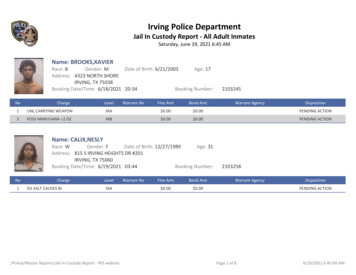

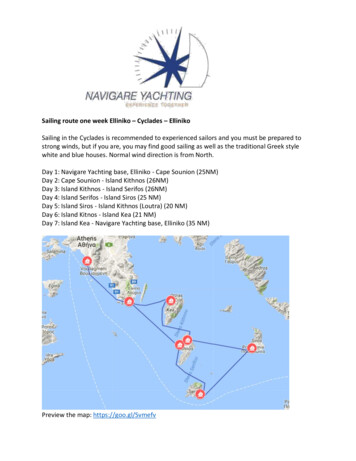

![Letter from Birmingham Jail (1963) [Abridged]](/img/2/1963-mlk-letter-abridged.jpg)
